浙江省平湖市全塘中学八年级英语下册《Module 3 On the radio》综合练习
最新外研版英语八年级下册《module 3 on the radio》教案2篇.doc

New standard English (八B) Module three嘉兴市二十一世纪外国语学校沈宇唐雯娟一、教材内容分析:本模块以电台广播活动为话题,通过对广播台的参观,文本主人公幼年时对广播收听的喜爱,长大后从事于广播事业继而成功的一系列事件展开。
以求掌握动词不定式及动词的现在分词形式做宾语的句式;把握与电台广播相关的词汇及日常用语;并通过文本的学习能够放眼实事,领会成功人士光环背后所需付出的努力与勤奋。
二、学情分析:(一)本模块围绕电台播音及广电台的活动而展开,相信学生对此内容颇感兴趣。
同时辅以主人公的早年经历为线索,联系现实,阐明兴趣的培养,对事业的执着与努力是将来成功的基础。
(二) 动词不定式做宾语结构在八(A)Module 9、10中均有涉足,可通过复习回顾加深学生的印象,但是学生对动词ing形式做宾语的句式掌握不多,故需反复操练;并且可将动词不定式与动词ing形式相结合,采用并行操练的形式,相信会有利于学生更好的掌握。
三、教学目标:(一)语言知识目标⑴词汇:presenter/reporter /article /manager /result /score /rain /prepare /glass⑵日常用语:We decide what to listen to and what to see./We’d like to thankyou./ I enjoy showing…around.⑶语法:remember to do/doing… /would like to/enjoy doing/stop doing/keep doing/⑷话题:讨论有关电台广播的相关话题以及名人的奋斗史。
(二)语言技能目标⑴听:熟练理解文本内容,并能通过课文听说训练,理解简单的英语广播播报。
⑵说:通过课文文本的学习,辅以问答及讨论的形式反复操练,学会复述课文,并能简单讲述某名人的奋斗史。
⑶读:提高泛读能力,掌握文本精华。
外研版八年级英语下册教案Module 3 On the radio
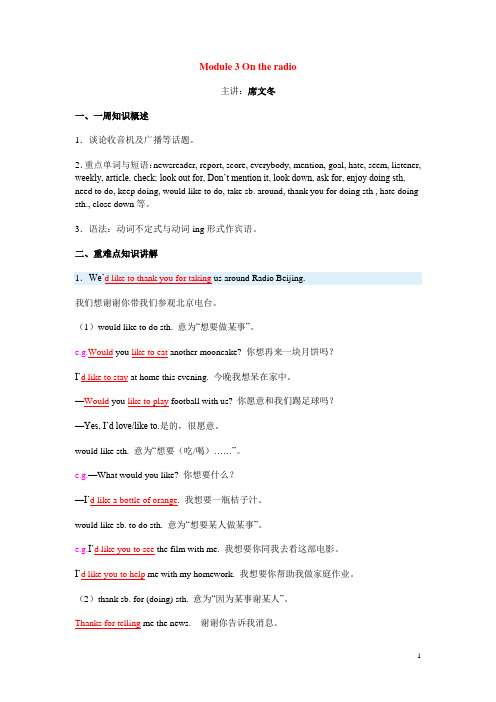
Module 3 On the radio主讲:席文冬一、一周知识概述1.谈论收音机及广播等话题。
2.重点单词与短语:newsreader, report, score, everybody, mention, goal, hate, seem, listener, weekly, article, check; look out for, Don’t mention it, look down, ask for, enjoy doing sth, need to do, keep doing, would like to do, take sb. around, thank you for doing sth , hate doing sth., close down等。
3.语法:动词不定式与动词-ing形式作宾语。
二、重难点知识讲解我们想谢谢你带我们参观北京电台。
(1)would like to do sth. 意为“想要做某事”。
e.g.Would you like to eat another mooncake? 你想再来一块月饼吗?I’d like to stay at home this evening. 今晚我想呆在家中。
—Would you like to play football with us? 你愿意和我们踢足球吗?—Yes, I’d love/like to.是的,很愿意。
would like sth. 意为“想要(吃/喝)……”。
e.g.—What would you like? 你想要什么?—I’d like a bottle of orange. 我想要一瓶桔子汁。
would like sb. to do sth. 意为“想要某人做某事”。
e.g.I’d like you to see the film with me. 我想要你同我去看这部电影。
I’d like you to help me with my homework. 我想要你帮助我做家庭作业。
Module 3 On the radio Period 3 教案(外研社八年级下)

Language goals 语言目标1. Key vocabulary 重点词汇explain voice seem weekly article glass sound check2. Key structures 重点句式When I was … I remember …Once a week I …Ability goals 能力目标Enable students to write a passage describing an important event in the past and some background information.Teaching important/difficult points教学重难点How to write a passage describing an important event in the past and some background information.Teaching methods 教学方法Reading and writing.Teaching aids 教具准备A projector and a computer.Teaching procedures and ways 教学过程与方式Step I Revision and lead-inCheck the homework.T: Last period we learnt how a radio program works. What is the first step of making the program?S: Collecting the latest news and writing the reports.T: What should we do then?S: Then we decide what to listen to… and what to see.T: Good. To do a radio program everyone in the station needs to speak English well. So we can see English is so important that we must work hard and study it well.And what do you think you should have if you want a job in radio?S: We should have good voice.T: Right. It is a very important quality for a radio presenter. Today we’ll read a story about a teenager’s early career. Before that, look at the pict ure on the top right of page 20. What does the picture show us?S: It shows us a working scene of workers on a radio program.S: Someone is reporting the news. And some are discussing.…Step II ReadingIn this step, students will read the passage and learn how to describe things in the past. T: Do any of us like to work on a radio program?S: Yes, I’d like if I could.T: Can you tell us the reason(s)?S: Yes. I love the radio. I often learn to make recordings of myself in my free time, and by doing this, I learn to improve my spoken English and my voice of speaking English.T: Very good. Good English and good voice are both important. Next please read the passage and answer the questions in activity 2.Ask some students to answer the questions after reading.Sample answers:1. A fifteen-year-old teenager.2.The story is about the how the writer’s career in radio begins.3.Maybe he wrote it for a memory.Then discuss the story with students to make sure they understand the order of the events.T: What is the writer doing in the story?S: The writer is asking for a job in radio.T: But the writer stops the story suddenly when he / she begins recalling his / her story in the earlier past. What did the writer tell us? Now read the following paragraphsand find out.After several minutes.T: From the story, we know the writer has always loved the radio. What did the writer say about his / her love for radio?S: From very young, the writer began sitting close to the radio in the living room, listening to favorite programmes and to the voices of favorite presenters.S: Then the writer asked for jobs in small radio stations.S: The writer learnt to play music from computer to listeners, talked about life at school.S: Then together with friends, they prepared the weekly programmes, articles about music, sports news, jokes and the weather report.T: Then the story went on. And the writer won the job finally. What do you think is the most important reason for the writer to get the job?S: The writer’s true l ove for radio.S: Maybe the writer has a good voice.…T: In the story of his asking for the job in WXBN, the writer puts in a long description of his / her earlier past story. Do you think it necessary? Why did the writer write the story this way?S: Ye s, it’s necessary. The long description explains why the writer asks for the job instead of staying at school.S: By writing this way, the story is more interesting.After this, ask students to read the story (aloud) and finish activities 3 and 4. Sample answers to activity 4:1.Because the writer thinks the question is difficult to answer. It is true that ateenager of fifteen-year-old should be at school, but it is not true to the writer. He / she loves the radio from very young. He / she wants to work on the radio at such a school age. He / She finds it difficult to tell the manager the real reason.2.His friends helped him.3.The writer prepared programmes about the weather by looking out of the window.Step III WritingAsk students to read the passage again to tell “events” from “background information”, and learn to write a story about past.T: Just as the writer did in the story, we need to put in the story some background information to make the story clear. Now read the passage again and find sentences which show more about the more important event in the past and background information.Sample sentences:More about important events:I sat down in the studio, in front of a microphone. He was in another room, behind the glass wall.All radio presenters begin work with the same question.Background information:At the age of nine, I asked for jobs in small radio stations.As I grew older, my interest in radio grew.I did this by looking out the window.After this, ask students to write a passage modeled after the text.Sample version:A lot of things happened in the past, and all of them seemed as if they just happened yesterday.I could still remember clearly this summer I spent in Beijing where I touched weapons in the Military Museum and talked with foreigners on the Tian'anmen Square; the moment I watched the World Cup on TV and saw Zinedine Zidane hit an Italian player with his head just to receive a red card; the time my Mum asked me to stop playing football after my failure of the mid-term.All what happened really made me happy, sad, cheer, silent or regret. However, they havebecome my memory and will not return forever. I can't change them at all. 2006 is over, symbolizing an end, as well as a beginning. For 2007 is coming. It's a new andhopeful year, standing for a gate of success. However long and hard the road may be, I won't shrink from it. I welcome it. The energy, the faith, the devotion which I bring to this endeavor will truly light the road.Step IV HomeworkAsk students to finish activities 5—9 on pages 105 and 106.。
八年级英语下册《Module 3 On the radio Teaching resources教学资源库》教案 外研版
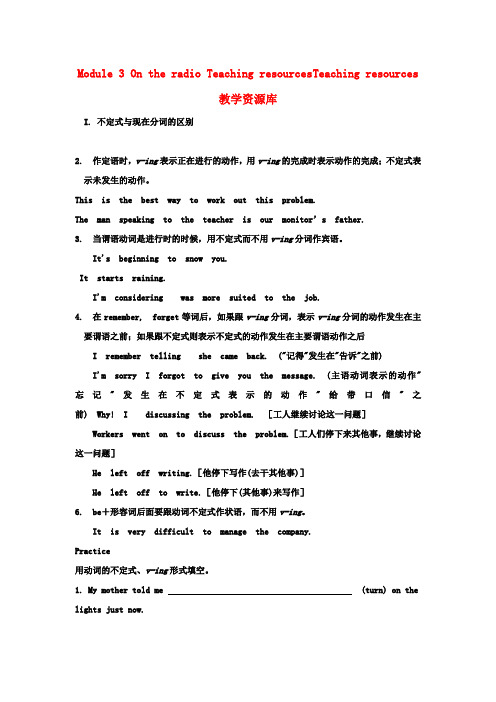
Module 3 On the radio Teaching resourcesTeaching resources教学资源库I. 不定式与现在分词的区别2. 作定语时,v-ing表示正在进行的动作,用v-ing的完成时表示动作的完成;不定式表示未发生的动作。
This is the best way to work out this problem.The man speaking to the teacher is our monitor’s father.3. 当谓语动词是进行时的时候,用不定式而不用v-ing分词作宾语。
It's beginning to snow you.It starts raining.I'm considering was more suited to the job.4. 在remember, forget等词后,如果跟v-ing分词,表示v-ing分词的动作发生在主要谓语之前;如果跟不定式则表示不定式的动作发生在主要谓语动作之后I remember telling she came back. ("记得"发生在"告诉"之前)I'm sorry I forgot to give you the message. (主语动词表示的动作"忘记"发生在不定式表示的动作"给带口信"之前) Why! I discussing the problem. [工人继续讨论这一问题]Workers went on to discuss the problem.[工人们停下来其他事,继续讨论这一问题]He left off writing.[他停下写作(去干其他事)]He left off to write.[他停下(其他事)来写作]6. be+形容词后面要跟动词不定式作状语,而不用v-ing。
八年级英语下册 Module 3 On the radio全模块综合测试 外研版
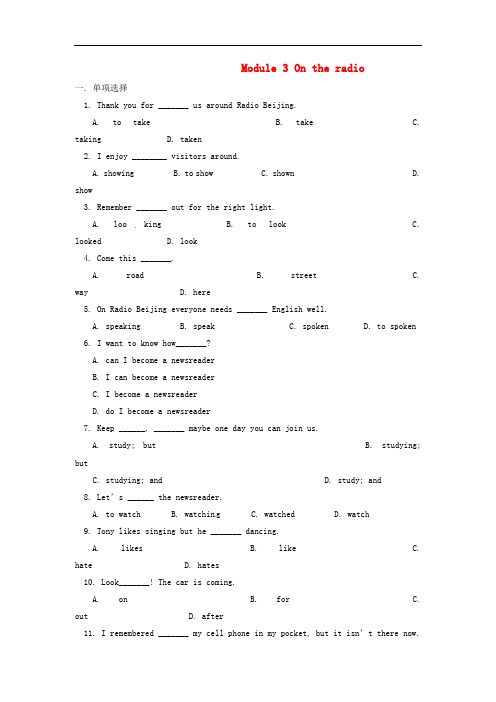
Module 3 On the radio一. 单项选择1. Thank you for _______ us around Radio Beijing.A. to takeB. takeC. takingD. taken2. I enjoy ________ visitors around.A. showingB. to showC. shownD. show3. Remember _______ out for the right light.A. loo kingB. to lookC. lookedD. look4. Come this _______.A. roadB. streetC. wayD. here5. On Radio Beijing everyone needs _______ English well.A. speakingB. speakC. spokenD. to spoken6. I want to know how_______?A. can I become a newsreaderB. I can become a newsreaderC. I become a newsreaderD. do I become a newsreader7. Keep ______, _______ maybe one day you can join us.A. study; butB. studying; butC. studying; andD. study; and8. Let’s ______ the newsreader.A. to watchB. watchin gC. watchedD. watch9. Tony likes singing but he _______ dancing.A. likesB. likeC. hateD. hates10. Look_______! The car is coming.A. onB. forC. outD. after11. I remembered _______ my cell phone in my pocket, but it isn’t there now.A. puttingB. putC. to putD. have put12. Their house is quite _______, we usually walk there.A. closedB. closeC. closelyD. closing13. You shouldn’t _______ on physical labor.(体力劳动)A. look overB. look upC. look outD. look down14. I heard ______ shout to me from the roadside.A. voiceB. a voiceC. noiseD. sound15. Come _______ me, and I will sh ow you around.A. toB. behindC. withD. on16. Please tell m e_______.A. what did you have for lunchB. what you had for lunchC. you had for lunchD. did you have for lunch17. Which is not correct after being put in the sentence?_______ to turn off the radio before you go out.A. Make sureB. RememberC. Why notD. Don’t forget18. The Great Wall seems ________ a dragon.A. beB. XC. likeD. to become19. Did he write all the articles ______ or did someone help him?A. in personB. in a personC. in the personD. in persons20. This was how my first _______ job in radio began.A. correctB. rightC. reallyD. real二. 完成句子21. 利物浦队进了两个球。
外研版八年级下 Module 3 On the radio
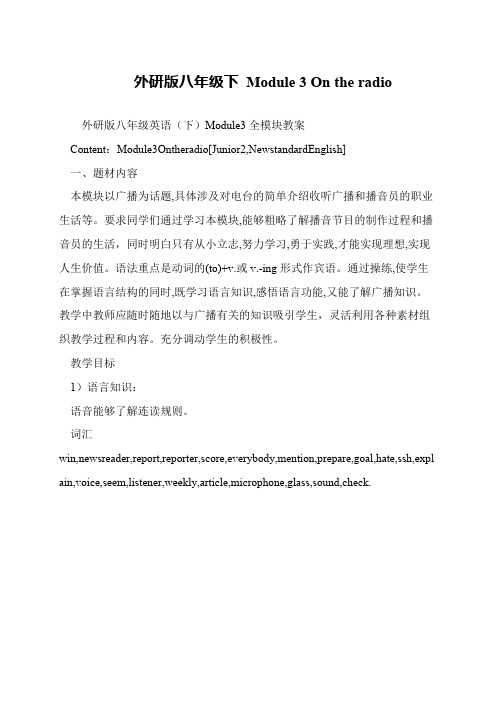
外研版八年级下Module 3 On the radio
外研版八年级英语(下)Module3全模块教案
Content:Module3Ontheradio[Junior2,NewstandardEnglish]
一、题材内容
本模块以广播为话题,具体涉及对电台的简单介绍收听广播和播音员的职业生活等。
要求同学们通过学习本模块,能够粗略了解播音节目的制作过程和播音员的生活,同时明白只有从小立志,努力学习,勇于实践,才能实现理想,实现人生价值。
语法重点是动词的(to)+v.或v.-ing形式作宾语。
通过操练,使学生在掌握语言结构的同时,既学习语言知识,感悟语言功能,又能了解广播知识。
教学中教师应随时随地以与广播有关的知识吸引学生,灵活利用各种素材组织教学过程和内容。
充分调动学生的积极性。
教学目标
1)语言知识:
语音能够了解连读规则。
词汇
win,newsreader,report,reporter,score,everybody,mention,prepare,goal,hate,ssh,expl ain,voice,seem,listener,weekly,article,microphone,glass,sound,check.。
八年级英语《Module3Ontheradio》课件

Read the structure and main idea of the article
Identify the topic and main idea of the article
Outlining
Teach students how to outline the listening material, breaking it down into main ideas and subpoints to create a visual presentation of the information
• Lesson Plan: The module is divided into five lessons, each focusing on a different aspect of radio, such as its historical development, the science behind radio waves, different types of radio programs, the impact of radio on society, and creating your own radio broadcast
Imitate promotion and integration
01
Listen to native speakers
Provide audio recordings of native English speakers to help students familiarize themselves with authentic promotion and introduction patterns
module-3on-the-radiounit-3八年级下

9. He learnt _to__s_p_e_a_k__(speak) on the radio.
Keys to Activity 4
1. article 2. glass 3. studio 4. manager 5. sunny
1. Did you listen to the _w_e_a_t_he_r_r_e_p_o_rt_? What will the _w_e_a_th_e_r____ be like tomorrow?
2. It’s going to be s_u_n_n_y______. It isn’t going to____r_ai_n_______.
两个规定加回绝: demand; ask; refuse 设法学会做决定: manage; learn; decide 不要假装在选择: pretend; choose
agree continue; decide; enjoy; hate; learn; keep; like; love; need; remember; start; stop; try; want
5. Hey, our team _s_c_o_re_d______ three goals. They __w_o_n____ the match. That’s fantastic!
6. Do you like other _s_p_o_r_ts_____ as well as football?
Module 3 on the radio
Unit 3 Language in use
动词不定式与动名词作宾语
外研版英语八下《module3ontheradio》word模块教案
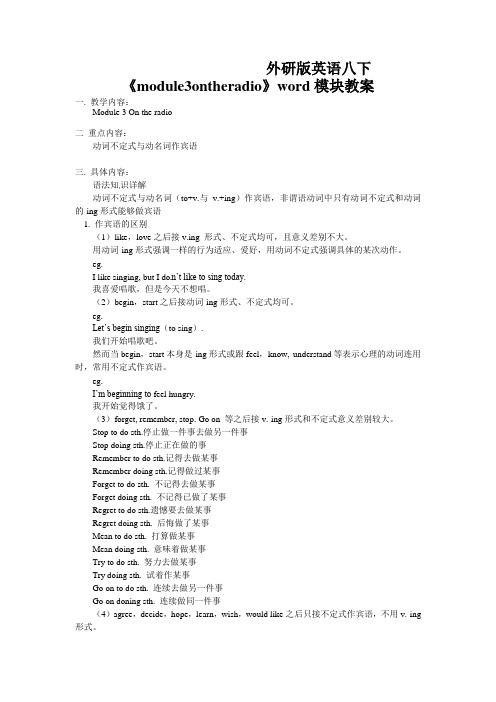
外研版英语八下《module3ontheradio》word模块教案一. 教学内容:Module 3 On the radio二重点内容:动词不定式与动名词作宾语三. 具体内容:语法知识详解动词不定式与动名词(to+v.与v.+ing)作宾语,非谓语动词中只有动词不定式和动词的-ing形式能够做宾语1. 作宾语的区别(1)like,love之后接v.ing 形式、不定式均可,且意义差别不大。
用动词-ing形式强调一样的行为适应、爱好,用动词不定式强调具体的某次动作。
eg.I like singing, but I do n’t like to sing today.我喜爱唱歌,但是今天不想唱。
(2)begin,start之后接动词-ing形式、不定式均可。
eg.Let’s begin singing(to sing).我们开始唱歌吧。
然而当begin,start本身是-ing形式或跟feel,know, understand等表示心理的动词连用时,常用不定式作宾语。
eg.I’m beginning to feel hungry.我开始觉得饿了。
(3)forget, remember, stop. Go on 等之后接v.-ing形式和不定式意义差别较大。
Stop to do sth.停止做一件事去做另一件事Stop doing sth.停止正在做的事Remember to do sth.记得去做某事Remember doing sth.记得做过某事Forget to do sth. 不记得去做某事Forget doing sth. 不记得已做了某事Regret to do sth.遗憾要去做某事Regret doing sth. 后悔做了某事Mean to do sth. 打算做某事Mean doing sth. 意味着做某事Try to do sth. 努力去做某事Try doing sth. 试着作某事Go on to do sth. 连续去做另一件事Go on doning sth. 连续做同一件事(4)agree,decide,hope,learn,wish,would like之后只接不定式作宾语,不用v.-ing 形式。
